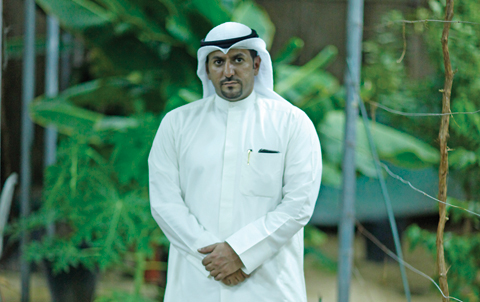 Kuwaiti Farmer Mubarak Al-Owaini. — Photos by Moayad Hassan
Kuwaiti Farmer Mubarak Al-Owaini. — Photos by Moayad HassanWhen you open the gates of the Al-Owaini greenhouse, you are hit by a draft of cool, humid air because of the huge exhaust fans that draw internal air outwards, condensing it to cool the place. Unlike regular greenhouses, this hothouse is like a field of experiments - a travelling funfair of trees, aromatic herbs and climbing vines. Between the pleasure of discovery and learning, the owner of the greenhouse, Mubarak Al-Owaini, took us on a journey of the secrets of his success in agriculture amid the harsh weather of Kuwait.
He explained with pride, delight and passion about his plants, as if they were his own children. "Let's start with figs. They are in the fruiting period. I have five types of them - the American is the sweetest. Another sweet type of fig is called Jassim Al-Shehab. It was named after the first Kuwaiti who brought the figs to Kuwait. I make sure that they grow to a natural size by not adding too much soil with fertilizers and nitrates, as some farmers do. I bear in mind that they will be eaten by my folks and friends, whom I don't want to harm," Owaini said.
Cultivating saffron
Two years ago, Al-Owaini farm succeeded in cultivating saffron, which grows in cold areas such as Europe and Iran, and is now entering the breeding stage of bulbs. "It's really difficult to cultivate saffron from seeds - I would definitely never recommend it. Not to mention that European countries forbid the export of saffron seeds. It's better to get them from the bulbs. The best one I bought was from Spain, but now I'm producing my own bulbs", he told Kuwait Times.
As he walked us through the trees, he stopped at the berries. "Usually, berries are produced once or twice a year. However, I managed to deceive the plant to fruit three times a year through the process of an irrigation cutoff period, pruning and pre-harvest irrigation," he said. There are four fruiting coffee trees at the Al-Owaini farm. The first person to grow coffee in Kuwait was Kuwaiti farmer Nasser Al-Azmi, through seedlings. He produced his first crop six years later. Four and a half years ago, Owaini took the coffee seeds from Azmi and planted them in his nursery. "The Yemeni Kholani coffee is one of the finest," Owaini claimed. "What you see is the first production."
Grapevines dangle from the terrace, and on one of the sidewalls, the climbing passion fruit tree is in the irrigation cutoff period. Under a grapevine, we sat along benches, waiting for the Kuwaiti tea to be prepared. It was strange to see that the tea bushes were tiny, unlike the ones you find in the highlands of Sri Lanka. "I'm intent on growing them small to ensure quality. The best tea leaves are baby ones that on the upper side of the bushes. So I keep them young and lowly. I don't produce large quantities - it's only for farm visitors", said Owaini. The tea was golden in color, refreshing and equally rich as he described. It was like something we'd never tasted.
Al-Owaini Farm is split into an outdoor crop area, an animal barn, a diwaniya and the greenhouse. It was originally run by his brother. "My late father held a passion for agriculture, and I inherited this from him and learned a lot from him. But my brother isn't into this, thankfully. He handed me the management of this farm because he knows how passionate I am. I wasn't ashamed to go to the top farmers in Kuwait to benefit from their experiences, and I owe them much. In addition, I'm constantly following up on the latest developments in this field," said Owaini.
Recognizing the problem
The greenhouse contains diverse fruits such as banana, fig, grape, guava, citrus, aromatic herbs and flowers, as well as aloe vera, in addition to ornamental trees. All of these usually grow in cold and humid regions, so how did Owaini succeed in cultivating these plants?
"We must first recognize that the problem of agriculture in Kuwait is not the sun - it's the hot air. You can grow any kind of plant if you can block the hot air around it during the summer. Secondly, plants are like humans and animals - they get hungry and thirsty. For instance, when one gets used to a set mealtime, he starts to think about food an hour earlier. If the food is delayed, he'll get upset, and maybe angry. It is crucial to water the plants on schedule. Otherwise, they will grow bigger but will never yield," he explained.
"Also, by mixing sand and water and pouring the mixture on top of the roof, I create a cloudy environment, so that the plants are not directly exposed to sunlight. When winter arrives and rain falls, it will rinse away the mixture and it will no longer be needed," Owaini added.
Owaini's interest in farming extends to animals and insects - he provides water for birds and cares for cats. He also doesn't kill "good" insects. "Beneficial insects feed on plant pestilence, and in this way, we rely less on spraying pesticides, which I carefully choose. I also abide by the period of pesticide exposure. No harvesting or entering the greenhouse is allowed until this period ends. We call this the period of prohibition," Owaini told Kuwait Times.
Owaini is known for his volunteer activities, and distributes free seedlings to citizens. In addition, he gives daily tips about agriculture on Instagram and Snapchat, and has hundreds of thousands of followers. "Kuwait went through a real sad time after the Iraqi invasion. People lost interest in agribusiness. It virtually disappeared due to the devastation. But now, it has strongly returned, especially among women," he beamed.
Follow Owaini @kwt.farmer on Instagram and @Fnatek on Snapchat
By Athoob Al-Shuaibi










